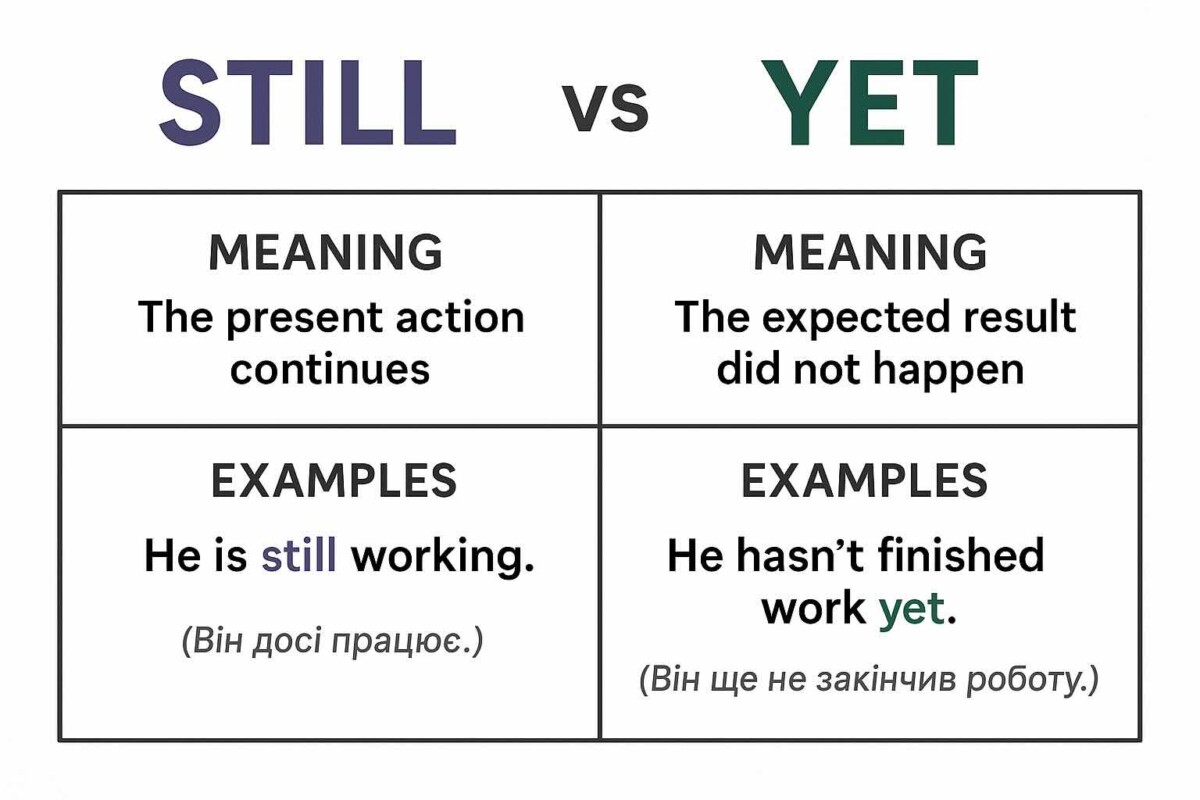✍️ Author’s Column | Tymur Levitin
Founder, teacher and translator at Levitin Language School / Start Language School by Tymur Levitin
🧠 Why Students Always Confuse Still and Yet
Ask any learner what still and yet mean — and the answer will be: “both mean ‘ще’ (🇺🇦) / ‘ещё’ (📖).”
That seems correct — but only at first glance.
In reality, these two small words live in different “worlds”:
- Still looks at the present state: something continues, nothing has changed.
- Yet looks at the result from the past until now: something has (not) happened up to this moment.
Still — Everything Continues
Meaning: something started earlier and is continuing now.
Position: before the main verb, after to be.
Examples:
- She still lives in London. → Вона ще досі живе у Лондоні.
- I’m still tired. → Я ще досі втомлений.
- He has still not arrived. → Він ще досі не прийшов (з ноткою роздратування).
💡 In Perfect tenses, still often expresses criticism or irritation:
- The government has still not delivered on its promises.
Yet — Expectation and Result
Meaning: something is (not) finished, but expected.
Position: usually at the end of the sentence.
- Have you finished yet? → Ти вже закінчив?
- I haven’t called her yet. → Я ще їй не дзвонив.
- Is he here yet? → Він уже тут?
💡 Yet naturally lives in Perfect tenses, but in spoken English it also appears with Simple forms:
- Are we there yet? (classic colloquial question)
- Is it 5 o’clock yet?
Still vs Yet in One Picture
- He is still working. → Він досі працює. (Focus: present action continues.)
- He hasn’t finished work yet. → Він ще не закінчив роботу. (Focus: expected result did not happen.)
Beyond Grammar: Style and Register
Just like in Ukrainian дякую vs спасибі, or in German Danke vs Vielen Dank,
English still and yet also have stylistic layers:
- Neutral: Have you finished yet? / She still lives here.
- Colloquial: Are we there yet?
- Emotional / Critical: You still haven’t done your homework!
That is why you hear one version in a textbook and another in films. Both are correct — the difference is in register.
Cross-Language Parallels
- 🇺🇦 ще / вже often match still / yet / already, but not always one-to-one.
- 🇩🇪 noch / schon / bereits overlap with still / yet / already, but with their own logic.
- 📖 ещё / уже also overlaps, but with its own nuances in meaning.
Understanding these cross-linguistic nuances helps avoid mistakes and builds multilingual awareness.
Conclusion
Both still and yet translate as «ще», but they point in different directions:
- Still = the situation continues.
- Yet = the situation has not (or has) happened until now.
Think of it this way:
- Still looks at the present.
- Yet looks at the past + expectation.

📌 Related articles:
- Myth: Just Speak — and You’ll Learn
- Understanding Realia in Translation: Cultural Nuances Across Languages
🌍 Read this article in other languages:
🇺🇦 Ukrainian version: Still vs Yet — одне слово, два світи
👉 https://timurlevitin.blogspot.com/2025/10/still-vs-yet_14.html
🇷🇺 Russian version: Still vs Yet — одно слово, два мира
👉 https://timurlevitin.blogspot.com/2025/10/still-vs-yet.html
🇩🇪 German version: Still vs Yet — ein Wort, zwei Welten
👉 https://timurlevitin.blogspot.com/2025/10/still-vs-yet-ein-wort-zwei-welten.html
🔗 English original:
https://levitinlanguageschool.com/english/still-vs-yet-one-word-two-worlds/
© Tymur Levitin — Founder, Director and Head Teacher at Levitin Language School / Start Language School by Tymur Levitin
Global Learning. Personal Approach.














